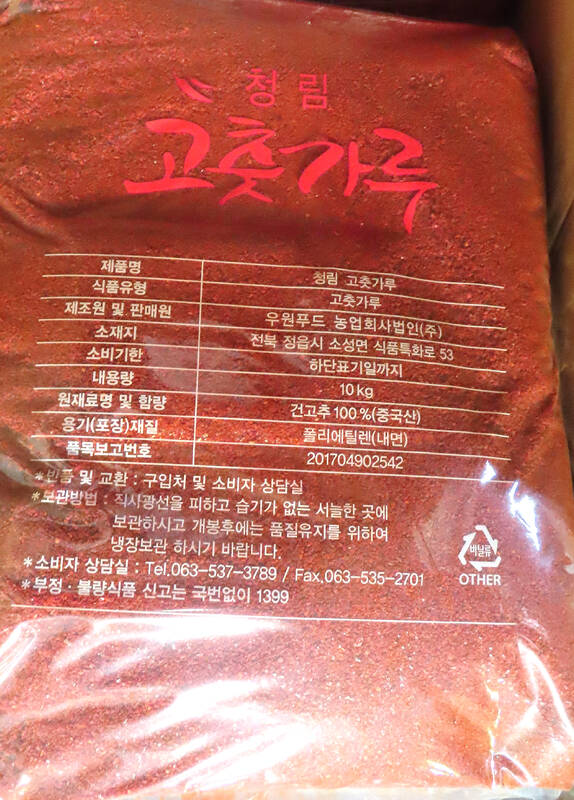The Food and Drug Administration (FDA) yesterday reported 14 batches of imported food-related items that failed border inspections, including 1 tonne of chili pepper powder and 9.9 tonne of dried chili peppers from China that were found to contain excessive pesticide residues.
Among the 14 were two 500kg batches of chili pepper powder imported from China by Tofu Restaurant Group (豆府餐飲集團), which operates several Korean restaurant chains, including Dubu House Korea (涓豆腐), Hanok Tofu (北村豆腐家) and Han Jeong Sig (韓姜熙小廚房).
The two batches of chili pepper powder were found to contain the pesticide chlormequat —which is prohibited in chili in Taiwan — at concentration levels of 0.22ppm and 0.28ppm respectively.

Photo courtesy of the Food and Drug Administration
A batch of 9.9 tonnes of dried chili peppers from China was found to contain 0.04ppm of the pesticide chlorpyrifos, which is also banned in chili in Taiwan, and exceeded the legal limit of 0.03ppm.
FDA Deputy Director-General Lin Chin-fu (林金富) said that as several batches of imported chili powder were found to be tainted with Sudan dye — an industrial additive banned in foods — earlier this year, the frequency of border inspections of chili powder from China and India has been changed to batch-by-batch since March.
Chili powder found to contain Sudan dyes is destroyed, according to tightened regulations, he said.
If it is found to have residues of a prohibited pesticide, it would be returned or destroyed, he said.
Premixed spices imported from Singapore for a Singaporean soy sauce chicken restaurant chain were also found to contain pesticide residues that exceeded the allowable level.
Other imported products that failed border inspections include two batches of fresh satsuma mandarins from Japan and a batch of paprika powder from Spain, both found to contain excessive pesticide residue.
Imports from Indonesia that failed inspections include a batch of Bumbu Pecel Karangsari (a peanut sauce) that contained excessive amounts of the bleaching agent sulfur dioxide; a batch of muntok white pepper with excessive pesticide residue; and a batch of pisang goreng (banana fritter) found to contain a prohibited sweetener.
Other products that failed border inspections were a batch of plates imported from China that failed a dissolution test; and a batch of fresh Chinese cabbage and a batch of fresh celery, both with excessive pesticide residues, and a batch of frozen baby octopus with excessive heavy metal residues, all imported from Vietnam.
The FDA also announced the results of its latest inspection of freshly made beverages and iced food products. It randomly sampled 474 products sold at 384 shops across the nation, with 34 shops failing at least one of the items tested.
These include a Wenshan green tea product sold at beverage chain Da Yung’s (大苑子) Nantou County shop, which was found to have Enterobacteria at a concentration of 410 colony-forming units per milliliter (CFU/mL), which is more than 40 times the allowable limit of 10CFU/mL.
Lin said that stores with products that failed inspections are being dealt with by their local health departments, with fines totaling NT$1.22 million (US$39,600) having been imposed so far.
Additional reporting by CNA

An undersea cable to Penghu County has been severed, the Ministry of Digital Affairs said today, with a Chinese-funded ship suspected of being responsible. It comes just a month after a Chinese ship was suspected of severing an undersea cable north of Keelung Harbor. The National Communications and Cyber Security Center received a report at 3:03am today from Chunghwa Telecom that the No. 3 cable from Taiwan to Penghu was severed 14.7km off the coast of Tainan, the Ministry of Digital Affairs said. The Coast Guard Administration (CGA) upon receiving a report from Chunghwa Telecom began to monitor the Togolese-flagged Hong Tai (宏泰)

A cat named Mikan (蜜柑) has brought in revenue of more than NT$10 million (US$305,390) for the Kaohsiung MRT last year. Mikan, born on April 4, 2020, was a stray cat before being adopted by personnel of Kaohsiung MRT’s Ciaotou Sugar Refinery Station. Mikan was named after a Japanese term for mandarin orange due to his color and because he looks like an orange when curled up. He was named “station master” of Ciaotou Sugar Refinery Station in September 2020, and has since become famous. With Kaohsiung MRT’s branding, along with the release of a set of cultural and creative products, station master Mikan

RISING TOURISM: A survey showed that tourist visits increased by 35 percent last year, while newly created attractions contributed almost half of the growth Changhua County’s Lukang Old Street (鹿港老街) and its surrounding historical area clinched first place among Taiwan’s most successful tourist attractions last year, while no location in eastern Taiwan achieved a spot in the top 20 list, the Tourism Administration said. The listing was created by the Tourism Administration’s Forward-looking Tourism Policy Research office. Last year, the Lukang Old Street and its surrounding area had 17.3 million visitors, more than the 16 million visitors for the Wenhua Road Night Market (文化路夜市) in Chiayi City and 14.5 million visitors at Tainan’s Anping (安平) historical area, it said. The Taipei 101 skyscraper and its environs —

Taiwan on Friday said a New Zealand hamburger restaurant has apologized for a racist remark to a Taiwanese customer after reports that it had first apologized to China sparked outrage in Taiwan. An image posted on Threads by a Taiwanese who ate at Fergburger in Queenstown showed that their receipt dated Sunday last week included the words “Ching Chang,” a racial slur. The Chinese Consulate-General in Christchurch in a statement on Thursday said it had received and accepted an apology from the restaurant over the incident. The comment triggered an online furor among Taiwanese who saw it as an insult to the